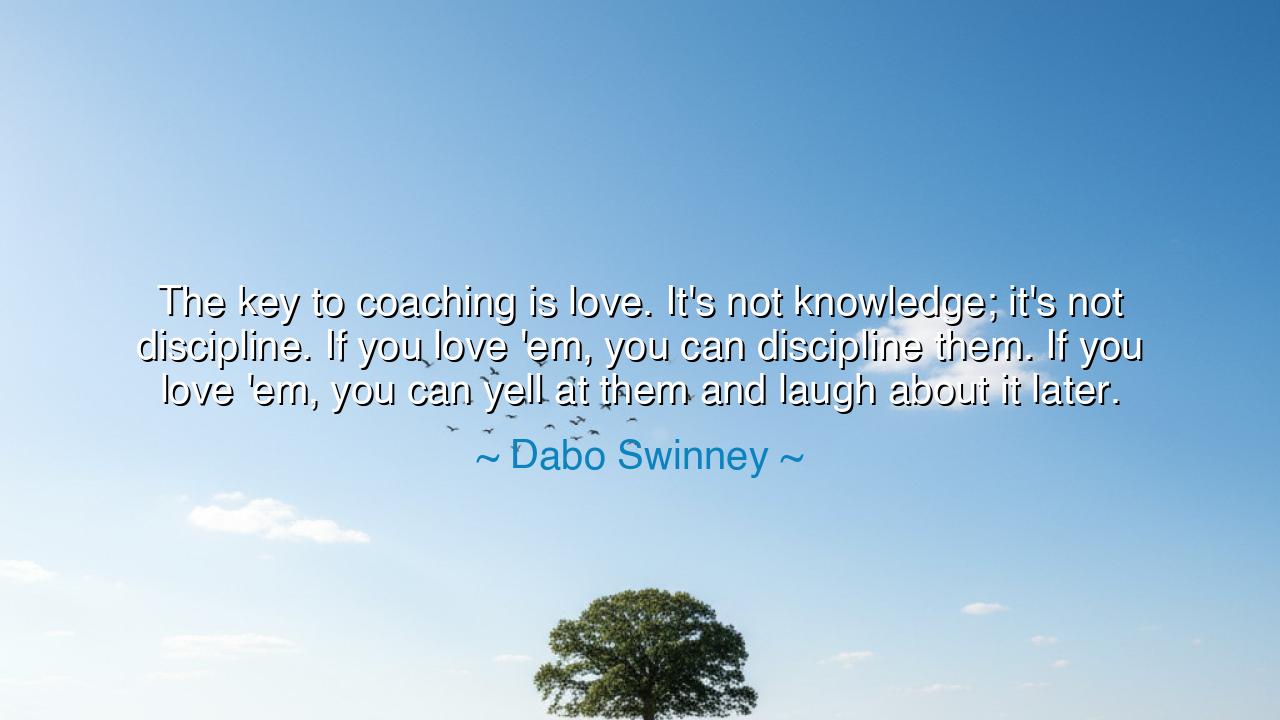
The key to coaching is love. It's not knowledge; it's not
The key to coaching is love. It's not knowledge; it's not discipline. If you love 'em, you can discipline them. If you love 'em, you can yell at them and laugh about it later.






“The key to coaching is love. It’s not knowledge; it’s not discipline. If you love ‘em, you can discipline them. If you love ‘em, you can yell at them and laugh about it later.” — Dabo Swinney
In these powerful and tender words, Dabo Swinney, the coach and builder of champions, reveals the sacred heart of leadership. He reminds us that love—not authority, not intellect, not control—is the truest foundation of coaching, mentoring, and guiding others. For knowledge can instruct the mind, but only love can awaken the soul. Discipline can correct behavior, but only love can transform character. To lead through love is to see beyond performance and results, to see the person—the heart that strives, the spirit that longs to be seen and believed in. Swinney’s wisdom calls us to remember that greatness is never built through fear, but through connection, trust, and compassion.
The origin of these words lies in the story of Swinney himself, a man who rose from hardship to triumph. Before he was a champion coach at Clemson University, he was a young man who endured poverty, pain, and struggle. He learned early that leadership was not about commanding others but about lifting them. His players do not merely follow him because he teaches them football—they follow him because he loves them. He speaks to their potential, not just their performance. When he says, “If you love ‘em, you can discipline them,” he means that true discipline, like a father’s correction, flows not from anger but from care. The player who knows he is loved will accept hard truth, because behind the rebuke he feels the warmth of belief.
This truth is ancient and universal. The wise teachers of old knew that love was the root of all true leadership. Aristotle wrote that the aim of education is to teach not facts, but virtue; and virtue is best taught through example and affection. The Stoics taught that the leader must care more for the people than for power, more for the student than for pride. Even Jesus of Nazareth, the teacher of teachers, led through love—rebuking his followers sharply when needed, but always with compassion. His correction was a mirror of faith, not fury. So too does Swinney’s teaching carry that same eternal light: that leadership, divorced from love, becomes tyranny; but leadership rooted in love becomes transformation.
Consider the story of John Wooden, the legendary basketball coach of UCLA. Wooden, like Swinney, built dynasties not upon tactics alone but upon trust. He taught his players discipline not through domination, but through dignity. He loved them enough to demand their best and forgive their failures. He, too, understood that knowledge and discipline without love become cold instruments—effective, perhaps, but lifeless. His players later spoke not of his championships, but of his heart. They said his love made them not just better athletes, but better men.
The essence of Swinney’s wisdom lies in the delicate balance between discipline and affection. For love does not mean softness, nor does care mean complacency. The leader who loves his people holds them to the highest standard, because he sees their worth. He yells not to harm, but to awaken; he demands not to dominate, but to inspire. And when the storm has passed, he laughs with them—not to erase the struggle, but to remind them that struggle itself is a shared journey, not a punishment. It is this sacred bond that turns teams into families, students into disciples, followers into believers.
But this teaching extends far beyond the field or the classroom. In every corner of life—in homes, workplaces, communities—the same law holds true: without love, guidance becomes oppression; without love, correction breeds resentment. The parent, the teacher, the mentor, the leader—all must first love those they serve. Only then will their knowledge be received, and their discipline understood. For love softens the hardest heart, and through love, truth finds its way where command alone cannot reach.
Therefore, let this wisdom be carved into the walls of your heart: if you would lead, first learn to love. See in others not their failures, but their promise. Speak truth, even when it wounds, but always lace it with compassion. Laugh with those you guide; share their burdens and their victories. Let your authority be rooted in empathy, your strength in kindness. For leadership built upon love endures where all else fails—it heals, it unites, it uplifts.
And so, remember Dabo Swinney’s timeless teaching: the key to coaching is love. Knowledge will sharpen your mind; discipline will strengthen your will. But only love will open the hearts of those you lead. Love gives you the right to demand, the grace to forgive, and the joy to celebrate. Love is not weakness—it is the highest form of power, for it transforms both the giver and the receiver. Lead, then, as the ancients would have taught—firm in purpose, tender in spirit, and guided always by the enduring flame of love.






AAdministratorAdministrator
Welcome, honored guests. Please leave a comment, we will respond soon